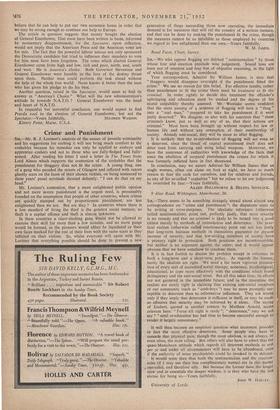Crime and Punishment
Snt,—Mr. R. J. Lorimer's analysis of the causes of juvenile criminality and his suggestions for curbing it will not bring much comfort to the coshables because his remedies can only be applied' to embryo and apprentice ,coshers and not to those who are fully-fledged and fully- armed. After reading his letter I read i. letter in The Times from Lord Alness which supports the contention of the' coshables that the punishment for thuggery does not fit the crime. A young thug, one of a gang who paraded the streets of Glasgow and inflicted with razors ghastly scars on the faces of their chosen victims, on being sentenced to three years' penal servitude shouted defiantly: " I can do that on my head."
Mr. Lorimer's contention, that a more enlightened public opinion and not more severe punishment is the urgent need, is presumably founded on the assumption that people of other countries, where crimes are quickly stamped out by proportionate punishment, are less enlightened than we are. But are they ? In countries where there is a low standard of- living the thief is the greatest social menace; so theft is a capital offence and. theft is almost unknown.
In these countries a razor-slashing gang would not be allowed to exercise their skill for more than a few minutes, and no more gangs would be formed, as the pioneers would efther be liquidated or their own faces marked for the rest of their lives with the same scars as they inflicted on their victims. So, whilst everyone will agree with Mr. Lorimer that everything possible should be done to prevent a new generation of thugs succeeding those now operating, the immediate demand is for measures that will rid the country of a serious menace, and that can be done by making the punishment fit the crime, though the measures cannot be so infallible as those employed by countries we regard as less enlightened than our own.—Yours faithfully, Road Farm, Churt, Surrey. W. M. Jams.










































































 Previous page
Previous page